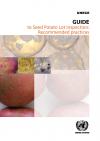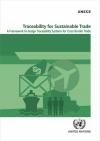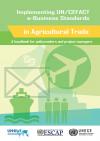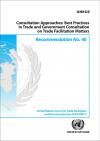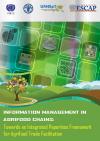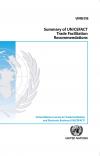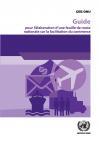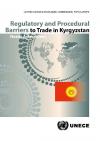Publications
Displaying Results 81 - 100 of 271
- English
This Guide refers to the UNECE STANDARD S-1, concerning the marketing and commercial quality control of Seed Potatoes. Knowledge of the relevant requirements is essential for the inspector.
Inspection is the visual examination of plants, tubers, containers, equipment or facilities by an authorized person, to determine compliance with regulations. Confirmation of symptoms can be supported by
- English
An upper-middle income country, Albania is in the process of implementing an all-encompassing reform effort to foster national competitiveness and achieve greater integration into global value chains.Driving these reforms is the imperative for fulfilling the requirements of the European Union (EU) Acquis Communautaire, which gained new life in 2014 when Albania
- English
The joint UNECE-OECD publication “International Regulatory Cooperation: the Case of the United Nations Economic Commission for Europe” presents the rule-making and standards-setting activities of UNECE.
It is illustrated by a number of examples that show how UNECE impacts our daily lives, including through:
- English
Consumers and producers are increasingly interested in knowing how products are made and whether there are any adverse environmental or social impacts. While two products may look or feel similar, consumers may still distinguish between them on the basis of certain intangible policy claims, such as whether they are “organic” or “sustainably produced”. Since these types of claims are difficult
- English
This Handbook presents a general framework for the design of of e-Business projects in the agrifood sector using open, international standards. It specifically looks at four e-Business standards developed by UN/CEFACT in the areas of:Electronic phytosanitary certificates; Electronic reporting of sustainable fishery management; Electronic exchange of laboratory
- English
Persimmons - Explanatory Brochure (ECE/TRADE/417)
The Explanatory Brochure on the Standard for Persimmons (ECE/TRADE/417) has been developed to harmonize the interpretation of the Standard, thereby facilitating international as well as national trade. It addresses producers and traders, as well as inspection authorities. It
- English
The purpose of Recommendation N°. 40 (ECE/TRADE/423) is to inform government agencies and private sector stakeholders about approaches to effective consultations that will be flexible, transparent, fair, accountable, and participatory. This Recommendation addresses issues such as
- English
International trade in agricultural and food products is more complex than trade in manufacturing – trade regulations are stricter, paperwork is more cumbersome and logistics are more complex. These elements are mainly required for ensuring food safety for consumers. Detailed information on traded goods alongside the movement of goods in a supply chain is critically
- English
This publication (ECE/TRADE/346/Rev.1) contains the latest information on trade facilitation recommendations established under the auspices of the United Nations Centre for Trade Facilitation and Electronic Business (UN/CEFACT). The publication provides a summary of the approved
- English
The aim of this bi-lingual Publication (ECE/TRADE/424) is to help bring voluntary standards into the toolbox of disaster risk reduction, including both by encouraging their use by business and by enhancing their role in regulatory practice and policy-making more generally. To this end, the paper
- English
This Recommendation, first published in 1974, has been revised in light of the changing context for Trade Facilitation and the adoption of the Trade Facilitation Agreement of the World Trade Organization. The revised Recommendation suggests that governments establish national trade facilitation bodies (NTFB) as an indispensable component of trade policy formation
- English
Trade facilitation creates a reliable, fast and cost-effective trade environment that benefits all countries and businesses, especially small and medium-sized enterprises (SMEs). It’s a collaborative effort by governments and traders to cut the costs of doing trade, reduce delays at borders, and make public agencies dealing with trade more efficient.Multiple
- English
Sixteen UNECE recommendations have been adopted by the Working Party since 1970 to address standardization and regulatory issues. They set out good practice regarding Regulatory cooperation, Metrology, Standards and Norms, Conformity assessment and Market surveillance.
Download the publication (ECE/TRADE/379/Rev.1) in
- English
In recent years, trade facilitation (TF) has been recognised as a key factor in trade and economic development policy. This is due to the realisation that trade facilitation can generate major benefits for the economy in terms of competitiveness and efficiency and can greatly enhance the participation of developing and transition economies in the global economy.
- English
The activities carried out by UN/CEFACT have very significant effects on the world we live in. They not only have specific impacts related to trade and e-business cutting across a broad range of domains, they also play a significant role in efforts to achieve even the most overarching goals such as poverty eradication and the reduction of inequality within and between
- English
This updated 2015 brochure (ECE/TRADE/415/Rev.1) provides information about the resources available, free of charge, from the United Nations Economic Commission for Europe (UNECE) that can be used to support Aid-for-Trade projects. The resources include international conventions, publications, standards and training materials, and
- Pусский
Руководство ЕЭК ООН по полевой инспекции семенного картофеля (ECE/TRADE/421) разработано с целью оказания странам помощи в практическом применении данного стандарта, последняя версия которого размещена на веб-сайте ЕЭК ООН.
Руководство рекомендуется к применению по усмотрению национального компетентного органа. В
- Français
Pour obtenir une récolte saine et à haut rendement de plants de pomme de terre pour le commerce international, les producteurs doivent au départ planter des plants de la plus haute qualité. La Commission économique des Nations Unies pour l’Europe (CEE-ONU) a élaboré une norme internationale de qualité de référence pour les plants de pomme de terre (Norme CEE-ONU S-1) afin d’aider les
- English
To harvest a plentiful and healthy yield of seed potatoes for trading internationally, producers have first to plant seed potatoes of the highest quality. The United Nations Economic Commission for Europe (UNECE) has drawn up an international reference quality Standard for Seed Potatoes (UNECE Standard S-1) to help producers do exactly this. The UNECE Guide to Seed Potato Field Inspection has
- English
Since 2010 the UNECE has been undertaking studies of regulatory and procedural barriers to trade in selected UNECE member countries with economies in transition, with a view to: assisting countries in their efforts to achieve greater regional and global economic integration; informing donors as to where assistance might be required; and, strengthening policy


